Please enter name here
advertisement
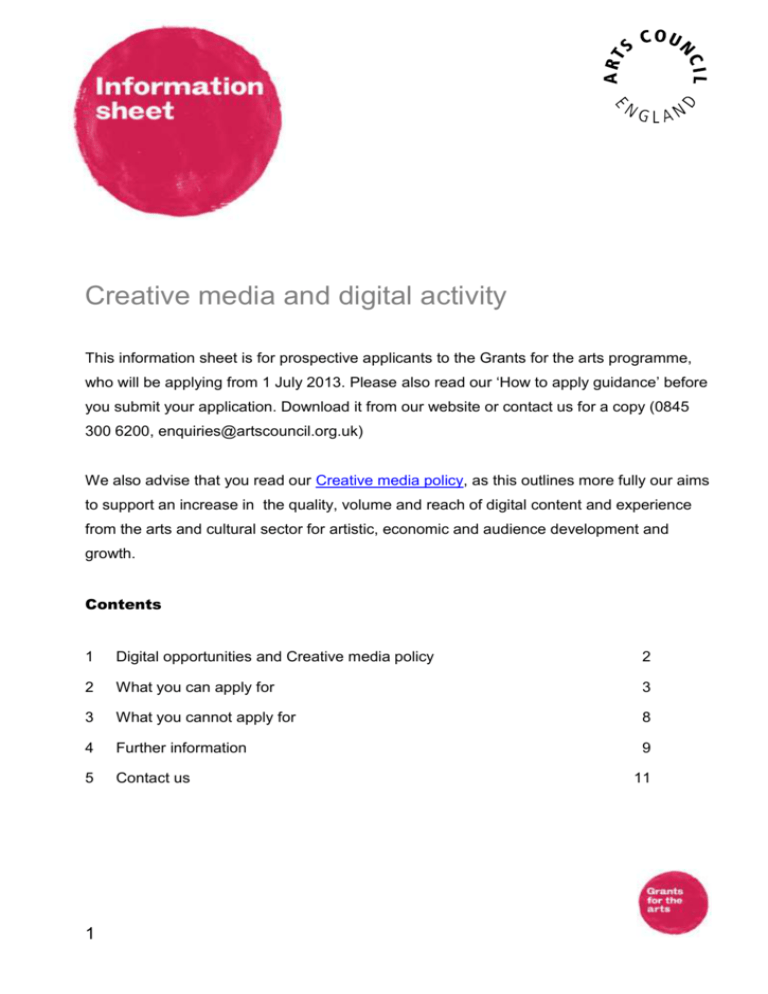
Creative media and digital activity This information sheet is for prospective applicants to the Grants for the arts programme, who will be applying from 1 July 2013. Please also read our ‘How to apply guidance’ before you submit your application. Download it from our website or contact us for a copy (0845 300 6200, enquiries@artscouncil.org.uk) We also advise that you read our Creative media policy, as this outlines more fully our aims to support an increase in the quality, volume and reach of digital content and experience from the arts and cultural sector for artistic, economic and audience development and growth. Contents 1 Digital opportunities and Creative media policy 2 2 What you can apply for 3 3 What you cannot apply for 8 4 Further information 9 5 Contact us 1 11 1 Digital opportunities and Creative media policy Digital opportunities apply to all our goals in Achieving great art for everyone, our strategic framework for the arts, as digital media technologies are affecting every aspect of our society, economy and culture. Responding to this, in 2012 Arts Council England launched a Creative media policy. Creative media has been traditionally used to describe the industries producing digital and creative content. This includes companies working in film, television, radio, interactive content electronic publishing, software and computer games. Within this wider ecology, Arts Council England uses creative media to refer to artistic and cultural works and content that are created for digital platforms and/or distributed digitally to engage the public. We can accept Grants for the arts applications which enable artists and arts organisations to explore creative media and digital opportunities in the arts and this information sheet provides guidance on this area. Further information about alternative funding for digital projects can be obtained from other sources listed in section four of this information sheet. 2 What you can apply for For details of the eligibility requirements for Grants for the arts please read the eligibility section of our ‘How to apply guidance’. As the development agency for the arts, we are keen to support arts development that supports our vision of great art for everyone, identified through the outcomes of reach, engagement, diversity, innovation and excellence. We are keen to support the following areas of digital activity; this is not an exhaustive list but an indication of the activities we are likely to support, which align to development areas of our Creative media policy: 2 skills and training talent development media production digital exhibition and distribution archives and collections data and metadata rights and intellectual property audience engagement and learning business models Please see our information sheet ‘Artists film and the moving image’ for more detail about what we do and do not fund in relation to film, video and the moving image. Skills and training Research has identified a particular need for skills and workforce development in relation to creative media production, commissioning and distribution. We also wish to encourage local networks and skills development projects that respond to current gaps in provision, such as for capacity building around rights, data and archives. Examples of activity we might fund: training and continuing professional development opportunities, including travel grants, for artists and arts organisations to up skill around digital technologies developing new partnerships with broadcasters and creative media companies to develop skills in digital media production digital and live platforms (events, networks, forums) to exchange knowledge and best practice regarding the use of digital in arts and cultural sectors organisational development or consultancy to upskill in digital areas through collaborations and/or training Talent development We wish to support new forms of creativity; emerging arts practice and artforms which embrace digital technologies and push the boundaries of traditional artforms. This could take the form of new art work or systems and platforms that enable new artwork using technology as a tool or as an intrinsic art form in its own right. Examples of activity we might fund: research to develop new artistic ideas, work or programmes in digital content 3 learning about new arts practice using digital technologies to create art work, e.g. developing new narrative styles and incorporating interactivity developing online platforms and networks for artists to collaborate and to explore collaborations with technologists Media production Low-cost production technologies mean that arts and culture can be available more quickly, cheaply, flexibly and at a higher quality than was previously possible. We will invest in and support artists and organisations so that they can develop new kind of audio-visual content that can engage audiences in new, interactive and participatory ways. We also encourage the arts and culture sector to form partnerships with organisations that have complementary expertise and resources that allow widespread effective production and distribution of content. Examples of activity we might fund: artform development; new forms of creativity or new artistic experiences that use digital technology as a medium for production or distribution commissioning of online digital projects, e.g. animation projects which are experimental in form or content, or technologically innovative the production of artists’ digital work, for example work related to the visual arts or other artform practice (eg dance) for galleries, cinemas, or the public realm Digital exhibition and distribution New technology, from smartphone apps to online streaming, has opened up new possibilities for artists and organisations to engage with audiences. Improving search, aggregation and curation are vital issues in the digital space to help improve and extend access to arts content across all art forms. Examples of activity we might fund: developing infrastructure to support opportunities for uploading and downloading of content to attract new audiences/participants development and sharing of smartphone/tablet apps where there is clear justification and evidence of demand, or need a distribution aid to an artistic product 4 online streaming of an event in order to further reach projects that develop new partnerships with broadcasters or new media companies to reach new and diverse audiences. festivals and events that bring digital artists and new audiences together online and offline, including programmes of artists’ work at film, gaming or digital festivals Archives and collections A huge amount of publicly-funded culture is contained in archives. Some has been digitised already, but much remains inaccessible. Greater coordination across the arts, cultural, heritage and creative media sectors can help ensure that arts and cultural archives and collections are digitised available, attractive, easy to find and can be brought to life in new ways. Examples of activity we might fund: digitisation and development of innovative online archives for significant arts and cultural collections skills development in archiving, rights management, curation and preservation supporting artists explore creative use and reuse of arts and cultural archive material and to understand the related rights issues Data and metadata The gathering of data and use of metadata (information about digital assets) is important in relation to creative media. Rich metadata can enhance users’ experience and the collection of data can help organisations to better engage and understand their audiences. Examples of activities we might fund: Culture Hack-type days and events for technologists to work with data held by arts and cultural organisations to creatively explore new uses and design new applications using this data business development linked to better understanding the value of cultural digital assets, including the data held about audiences and how this can be used to maximise public value 5 Rights and intellectual property Rights and intellectual property issues challenge many artists and organisations who may lack knowledge, confidence and experience in clearing rights for digital distribution or exhibition. Specialist training and support may be needed to help organisations make their work available digitally and derive an income from their assets. Examples of activity we might fund: exploitation of intellectual property in the arts by non-profit arts organisations for public benefit or commercial gain. For example, exploring open source and creative commons principles, balancing out financial sustainability, commercialising content and establishing rights for content creators developing partnerships with creative media companies and consultants to advise on intellectual property as part of organisational development or content production online platforms, networks or live events to share models of best practice within the arts and cultural sector regarding issues of rights and intellectual property Audience engagement and learning Using digital technology to reach and engage new audiences for the arts and in new ways, enhancing networks and developing marketing and communication channels to increase participation and audiences. Examples of activity we might fund: websites as part of a comprehensive marketing strategy for an event where that event is the main focus of the application. Where the website itself is the sole focus of the application there needs to be a clear justification of its unique function, plus evidence of demand, need or use by an existing community of users audience development activities aimed specifically at meeting the needs of audiences and helping arts organisations to develop long-term relationships with audiences. For example digital marketing, online, through mobile phones and reaching audiences through Web 2.0 and exploring the potential of Web 3.0, increasing the number of people viewing arts projects online 6 workshops that encourage new participants to explore and experience digital content Business models We will support arts and cultural organisations who want better to understand how digital technologies can help them to develop new business models that will allow them to raise revenue, explore untapped markets and lower their operational costs. Examples of activity we might fund: organisational development and consultation to develop digital strategy and explore how digital can develop sustainable business models innovative R&D activities that encourage experimentation through use of technology to increase more effective organisational business models and practice .e.g. technologists in residence within arts and cultural organisations buying assets, such as equipment, computers, software, where this activity is crucial to the delivery of a sustainable service. For further information on buying equipment please see our ‘Musical instruments and second-hand equipment’ information sheet. 3 What you cannot apply for Please see the guidance notes for Grants for the arts for details of what you cannot apply for. Some examples of activities that would not be eligible for Grants for the arts are: activity that does not have the arts or artistic practice at the core mainstream commercial activity traditional narrative films. Please see our information sheet ‘Artists film and the moving image’ for more detail about what we do and do not fund in relation to film, video and the moving image. 7 promotional web-based digital content projects websites for self promotion. 4 Further information Our Creative media policy and information regarding the Arts Council’s digital innovation initiatives, such as the Digital R&D Fund for the Arts and The Space, can be found in the Digital innovation and Creative media section on our website. Creative activity in the digital domain crosses over to a number of funding bodies’ priorities. This can sometime make it difficult to know which agency to approach. Below is a list of agencies with which we work closely on the digital agenda and that have their own programmes of support. Visit their websites for information on their current opportunities. Nesta Nesta is the National Endowment for Science, Technology and the Arts - a unique and independent body with a mission to make the UK more innovative. Nesta and the Arts and Humanities Research Council are our funding partners for the Digital R&D Fund for the Arts www.nesta.org.uk British Film Institute (BFI) BFI is the lead body for film in the UK, supporting filmmakers in the UK who are emerging or world class and capable of creating distinctive and entertaining work. Phone: 020 7255 1444 www.bfi.org.uk Creative England Creative England supports the sustainable growth of independent creative businesses and the talent that feeds them, in all parts of England outside London. It builds on the work of the Regional Screen Agencies, assisting in the development of film, TV, interactive games and digital media industries and the growth of film culture in England. In Oct 2011, Creative England became the BFI delegated body for the distribution of lottery-funded film activity: film culture (film heritage, film education and film exhibition), talent development and location/production services. www.creativeengland.co.uk 8 Technology Strategy Board The role of the Technology Strategy Board is to stimulate technology-enabled innovation in the areas which offer the greatest scope for boosting UK growth and productivity. It promotes, supports and invests in technology research, development and commercialisation. www.innovateuk.org Creative Skillset The UK-wide Sector Skills Council for the creative industries, Creative Skillset offers skills and training for people and businesses to ensure the UK creative industries maintain their world class position. This includes individual and organisation funding and bursaries for film/television training www.creativeskillset.org 4 Contact us Phone: 0845 300 6200 Email: enquiries@artscouncil.org.uk Textphone: 020 7973 6564 Website: www.artscouncil.org.uk Post: Arts Council England Grants for the arts PO Box 4353 Manchester M61 0DQ. © Arts Council England June 2013 9
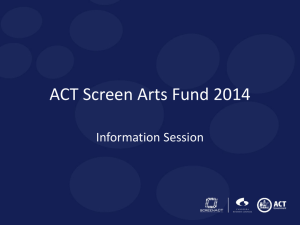
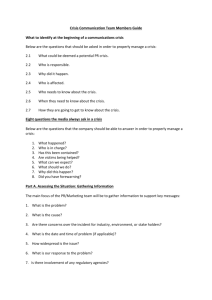

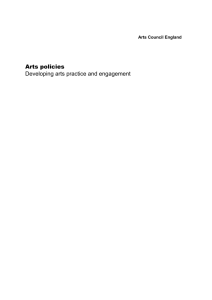

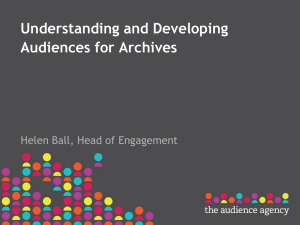

![Creative media policy [Word 131.5 KB]](http://s3.studylib.net/store/data/007256422_1-3b276ce311e8ed6047f780d16a25f6f0-300x300.png)